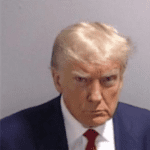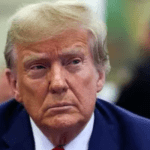Officials in the US state of Georgia are investigating online threats made against members of the grand jury that indicted Donald Trump on Monday.
Personal information, including the addresses and photos of the jurors, were shared on right-wing platforms.
Fulton County Sheriff’s Office said it was aware of the threats, and was trying to track down those behind them.
The names of the jurors were published in the indictment, a routine practice in Georgia.
But after their identities emerged in that document, supporters of former President Trump seemingly compiled further information available online and posted photographs and addresses to forums, including the social media site Telegram.
It comes just days after the jury voted to indict Mr Trump on 13 charges, which include racketeering and election meddling. He has said the charges are politically motivated.
Officials said that along with jurors’ personal information, threats against them were also shared. Police say the threats could amount to jury intimidation.
It said they took the matter very seriously and would respond quickly to ensure the safety of jurors.
In one message shared on Facebook a user wrote: “I thought it only fair to share a few names from that grand jury.”
The post, which included possible addresses and phone numbers for several jurors, was later removed.
Other messages posted by users to Truth Social, the site owned by Mr Trump, urged his supporters to “make sure [the jurors] can’t walk down the street” and to make them “infamous”.
Media Matters, a non-profit organisation that monitors conservative media bodies, reported that one user called the information a “hit list”.
Some posts reportedly include violent rhetoric against Fani Willis, the prosecutor who is overseeing Mr Trump’s case in Georgia.
Two NBC News reporters who wrote about the grand jury incident also had their own purported addresses posted online, the Reuters news agency reported.
Georgia is an outlier in the US legal system as it shares the identity of the jurors, which it says is to allow the public to have a greater faith in the legal system.
But they do not make their addresses or any other personal information public.
Mr Trump, who is the front-runner for the Republican nomination to run for president in the 2024 election, has consistently hit out at those leading cases against him.
Earlier this month, US prosecutors reported a post that he wrote on Truth Social to a judge, claiming it was intended to intimidate people involved in a case against him.














